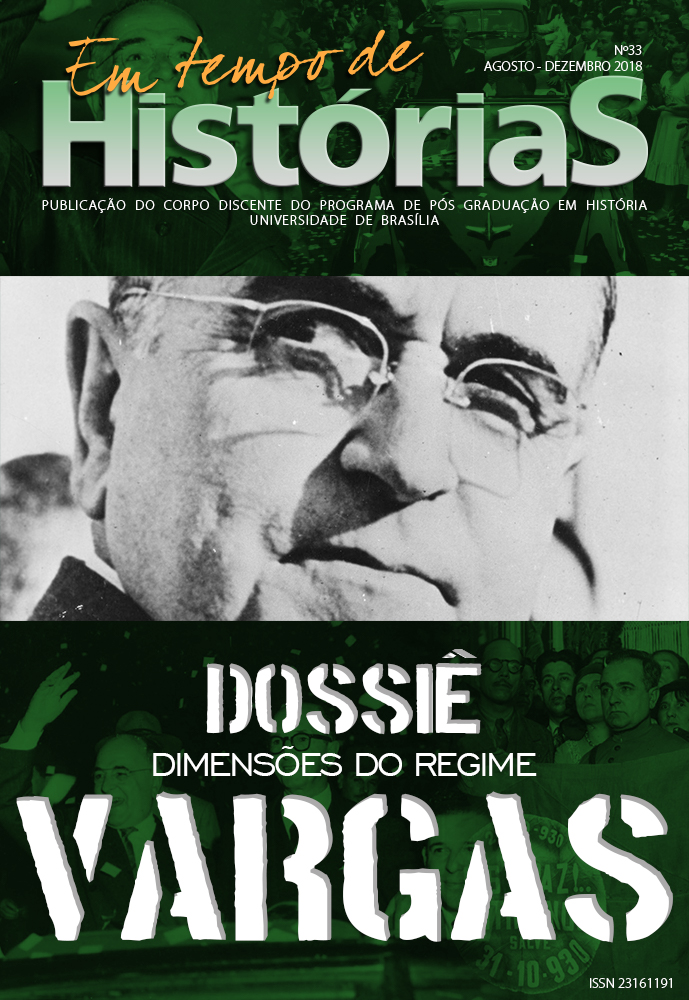Carnaval é política:
a criação da Federação Carnavalesca de Pernambuco (1930-1950)
DOI:
https://doi.org/10.26512/emtempos.v1i33.22854Keywords:
Carnaval. Federação Carnavalesca de Pernambuco. Estado Novo.Abstract
The purpose of this article is to analyze the organization of the Carnival of Recife as part of the process of modernization of the capital of Pernambuco (1930-1950). The control to the popular ones during the reign of Momo becomes intense as the city needed to show itself civilized and with order. The elites tried to interfere in the daily life of the working class, seeking to neutralize both political and leisure movements and amusements. In this way, there was an incentive to assimilate moralizing practices, as well as an attempt to train the dominated, to gain control in their moments of not working, trying to control their habits and diversions. The conquest of the streets by the people increased the violence in the reign of Momo. The years of 1930 are marked by a strong competitiveness and conflicts between the carnival clubs. And this wave of violence became a concern not only of the political authorities, but also of the businessmen of the time. Facing the insecurity during days of celebration, in the decade of 1930 was created Federation Carnavalesca Pernambucana. According to the Pernambuco Carnival Yearbook, the arguments that justified its creation were that the "high society" of Pernambuco was interested in the state's progress, and that it was necessary to make Recife a city of tourism, Carnival and order. Thus the article contributes to the study of the phenomena of the party, in our case, the Carnival, and the unfoldings, voices and interests that circulate in it. This research converses with historians of social history of culture, such as e. p. Thompson and Michel de Certeau, whose goal is to understand the festive forms of society and primarily be social that is inserted in its rules and structures.
Downloads
References
ALBUQUERQUE JÚNIOR, D. M. Festas para que te quero: por uma historiografia do festejar. Revista Patrimônio e memória, UNESP-FCLAs-CEDAP, v.7,n.1,pp.134-150, jun.2011.
ALMEIDA, Maria das Graças Andrade Ataíde de. A construção da verdade autoritária. São Paulo: Humanitas: FFLCH: USP, 2001, p.149.
ARRAES, Marcos Alexandre. Primeiro enunciado de Modernidade: o discurso do moderno no Recife nas décadas iniciais do século XX. Revista do departamento de História e Ciências Sociais, UFG, v. 7, p. 101-121, 2010.
ARRAIS, Raimundo. Recife, culturas e Confrontos. Natal: EDUFRN, 1998.
ARAÚJO, Rita de Cássia Barbosa de. Festas: Máscaras do tempo: entrudo, mascarada e frevo no Carnaval do Recife. Recife: Fundação de Cultura da Cidade do Recife, 1996
ARAÚJO, Rita de Cássia Barbosa de. DIP DOPS no frevo: Carnaval, política e identidade cultural em Pernambuco (1930-1945). In GUILLEN, Isabel Cristina Martins (org). Tradições e traduções: a cultura imaterial em Pernambuco. Recife, Ed. UFPE, 2008.
CERTEAU, Michel de. A invenção do cotidiano. 1: artes de fazer. 20ª Ed. São Paulo: Vozes, 2013.
CHARTIER, Roger. Cultura Popular revisitando um conceito historiográfico. In: Estudos Históricos, Rio de Janeiro, vol. 8, no. 16, 1995.
COUCEIRO, Sylvia Costa. Artes de viver a cidade: conflitos e convivências nos espaços de diversão e prazer do Recife nos anos de 1920. Recife, tese de Doutorado em história. UFPE, 2003.
FARGE, Arlette.O sabor do arquivo. São Paulo: Edusp, 2009.
FERREIRA, Ascenso. Ensaios folclóricos. Recife: Secretaria de Educação do Estado de Pernambuco, 1986.
LIMA, Ivaldo Marciano de França. Entre Pernambuco e a África. História dos maracatus nação do Recife e a espetacularização da cultura popular (1960-2000). Rio de Janeiro,tese de doutorado em História, UFF, 2010.
SANTANA, Andresa Bezerra de. Silêncio no centro do Recife: as práticas urbanísticas e o calar de um monumento no período estado novista. Salvador: II Seminário Internacional Urbanístico, 2012.
SANTOS, Mário Ribeiro dos. Trombones, tambores, repiques e ganzás: a festa das agremiações carnavalesca nas ruas do Recife (1930-1945). Recife, dissertação de mestrado em história, UFRPE, 2010.
SILVA, Leonardo Dantas. Elementos para história social do Carnaval do Recife. In: Maior, M. S; Silva, L.D. Antologia do Carnaval do Recife. Recife: Massangana, 1991
THOMPSON, E. P. Introdução: costume e cultura. In: THOMPSON, E. P. Costumes em comum. Estudos sobre a cultura popular tradicional. São Paulo, Companhia das Letras, 1998.
VIDAL, Francisco Mateus Carvalho. A Fresta do estado e o Brinquedo para os populares: História da Federação Carnavalesca Pernambucana (1935-1949). Recife, dissertação de mestrado, UFPE, 2010.
Downloads
Published
How to Cite
Issue
Section
License
Autores que publicam nesta revista concordam com os seguintes termos:
- Autores mantém os direitos autorais e concedem à revista o direito de primeira publicação, sendo o trabalho simultaneamente licenciado sob a Creative Commons Attribution License , licença que permite que outros remixem, adaptem e criem a partir do seu trabalho para fins não comerciais, e embora os novos trabalhos tenham de lhe atribuir o devido crédito e não possam ser usados para fins comerciais, os usuários não têm de licenciar esses trabalhos derivados sob os mesmos termos.
- Autores têm autorização para assumir contratos adicionais separadamente, para distribuição não-exclusiva da versão do trabalho publicada nesta revista (ex.: publicar em repositório institucional ou como capítulo de livro), com reconhecimento de autoria e publicação inicial nesta revista.
- Autores têm permissão e são estimulados a publicar e distribuir seu trabalho online (ex.: em repositórios institucionais ou na sua página pessoal) a qualquer ponto antes ou durante o processo editorial, já que isso pode gerar alterações produtivas, bem como aumentar o impacto e a citação do trabalho publicado (Veja O Efeito do Acesso Livre).













